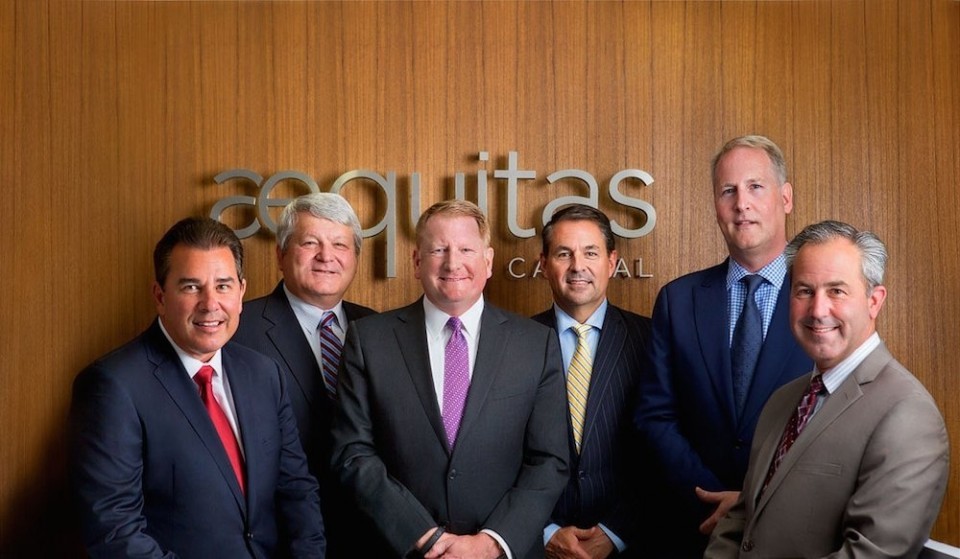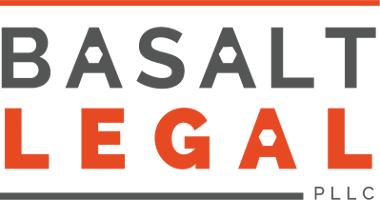- CALL TODAY
- 800.487.4660
SPECIAL REPORT: Aequitas Capital Will Cause Widespread Investor Losses Due to Devious Use of TAMPS; Investment Advisors Like Private Advisory Group & Strategic Capital Alternatives Had Perverse Incentives to Invest in Aequitas Capital Opportunities Fund

From left to right: Bob Jesenik, CEO & CIO, Scott Gillis, COO, Craig Froude, EVP, Brian Rice, EVP, Andy MacRitchie, CCO, and Brian Oliver, EVP
INVESTOR ALERT: AEQUITAS IMPLOSION LIKELY TO LEAD TO LARGE INVESTMENT LOSSES
Investors in the Pacific Northwest are starting to feel the effects of a $500 million financial implosion coming from the now almost deserted headquarters of Aequitas capital management in Lake Oswego, Oregon.
Aequitas focuses on high risk loans (“specialty finance” in financial advisor parlance). For example, through its subsidiary CarePayment, Aequitas loaned money to medical patients who could not afford their health insurance deductibles. Through a company called Campus Student Financing, LLC and the Genesis Loan Program, Aequitas provided expensive, risky private loans to augment the federal loans received by students at now defunct Corinthian Colleges.1 Aequitas also funds the expansion of investment advisory firms.
Uncollectable Student Loans May be Causing Aequitas to Implode.
Aequitas has purchased over $500 million in student loan debt from Corinthian Colleges. Corinthian collapsed in May 2015, leaving Aequitas holding around $100 million in unpaid—and perhaps uncollectable—debt. It appears that Aequitas may have forgotten the most important rule of investing, that diversification is the key to limiting investment losses.
Other Aequitas subsidiaries and affiliates may be struggling too.
According to an article in The Oregonian, Aequitas had two massive layoffs in January 2016, going from a staff of over 100 to “just a skeleton crew,” due to a “catastrophic cash-flow problem.”2 An investment firm that grew rapidly has now replaced its website with a static placeholder page and has retained consultants to advise on a potential restructuring.3 Aequitas investments are now so risky that brokerage firm TD Ameritrade will no longer allow investors to keep these investments at the firm. Aequitas may soon file for bankruptcy.
While the exact cause of Aequitas’s collapse is not yet completely understood—and might not include a Ponzi scheme or other form of investment fraud—the firm has suspended payment to investors in Aequitas Capital Opportunities Fund and Aequitas Capital Opportunities Fund II. There are rumors that the Securities & Exchange Commission is investigating Aequitas Commercial Finance.
Thanks to Investment Advisors, High Net Worth Investors Across the Country May Share in the Pain of Aequitas’ Investment Losses.
Aequitas’ genius was not in investing in dodgy debt; there are loads of investment firms and funds that do that. What sets Aequitas apart was their ability to convince independent investment advisors to fund its rapid growth.
Investment advisors are usually the good guys in stories about financial advisory business. Usually they are compared to stockbrokers (who now call themselves financial advisors). Stockbrokers sell products and get paid commissions. Their only obligation is usually to ensure that whatever product they push on investors is “suitable” for them. While stockbrokers can provide good advice, their incentive is to sell the product that pays them the highest possible commission. In contrast, investment advisors are paid a percentage of the assets they manage. Investment advisers have ongoing fiduciary duties to their clients.
Aequitas used a compelling three-part approach to convince independent investment advisors to buy Aequitas investments for their clients.
First, Aequitas paid kickbacks to advisors of 2% of all funds invested.. In other words, Aequitas tried to treat investment advisors like stockbrokers, and it worked. Aequitas tried to divide their loyalties by putting money in their pockets. While these kickbacks may have been disclosed and may have even been legal, they were not charity. Aequitas paid this money to convince investment advisers to invest in Aequitas for their clients.
Second, Aequitas repeatedly described their products as safe investments that offered an unusually high return (8-12% yield) while still being low risk. For example, they described their deal to buy Corinthian College student debt as “can’t lose” because, supposedly, Corinthian was obligated to repurchase any debt Aequitas failed to recover. In the post-2008 world of low interest rates, a yield of 8-12% is extraordinary. It is even higher than historic, annual stock market returns. Investment advisers and their clients were both attracted to the yield paid on Aequitas’ alternative products.
Third—and this is really novel—Aequitas convinced investment advisors to sell its products by offering select investment advisors funding to grow through a merger spree, buying other firms. In some cases, Aequitas provided this funding by buying a minority stake in investment advisory firms, but other times it purchased majority stakes. Aequitas affiliate Aspen Grove Equity Solutions, LLC was the vehicle Aequitas used to purchase interests in investment advisors.
Receiving Both Kickbacks and Investment Capital, Investment Advisors were Willing to Ignore the Obvious and Extreme Risk of Loss that Came with Investing in Aequitas Funds.
There are many investment advisors that accepted investments from Aequitas, but some of the larger firms include:
a) Private Advisory Group of Redmond, Washington. Managed by Chris Bean but owned primarily by Aequitas, Principal Advisory Group had $689 million in assets under management as of its most recent SEC filing.
b) Strategic Capital Alternatives of Gig Harbor, Washington had $1.1 billion in assets under management.
c) Argentus Advisors of Gig Harbor, Washington and Dallas, Texas had $243 million in assets under management.
d) Concert Wealth Management of San Diego, California merged with fellow Aequitas financing recipient Fieldstone Financial of Foxboro, Massachusetts to form a firm with $1.9 billion in assets under management.
Buying a piece of these investment advisors was a brilliant move by Aequitas. Investment advisors it owned (even if only partially) had explicit or implicit obligations to buy millions of dollars in Aequitas investments.4 Like an oil refinery buying gas stations, Aequitas’ attempt at vertical integration successfully brought its products to tens of thousands of wealthy investors.
These investment advisors are not just significant because they approved investments to and from Aequitas, but also because of their size and their clients. While these investment advisors accept individual clients, their largest clients are… wait for it… other investment advisory firms!
An investment advisor which primarily serves other investment advisors is offering TAMP (Turnkey Asset Management Program) services. In other words, these investment advisors do all the hard work that an investment advisor would normally do himself, like research, constructing portfolios, rebalancing investments, and creating and implementing tax strategies. In other words, when your investment advisor places you in a TAMP, he is essentially abdicating his role of selecting and managing your investments. What is left for your investment advisor to do? Schmooze with you, of course.
These large TAMP investment advisors were perfect targets for Aequitas because they made investment decisions, not just for themselves, but also for other investment advisors who had abandoned their job of investing in order to spend more time grabbing drinks with clients and shooting rounds of golf.
Perhaps the only good thing to come out of Aequitas’ unique growth strategy is that investors who have suffered Aequitas losses have intermediary investment advisors who they can also seek to hold responsible for their investment losses.
If you have Aequitas investments in your portfolio,5 you owe it to yourself to reach out to an experienced investment loss law firm and learn whether you can recover your investment losses.
Investor Defense Law LLP is a law firm dedicated to helping investors in California, Georgia, and Washington State recover investment losses.
We understand investment fraud and financial advisor malpractice. Our lawyers know how to sue investment advisors, brokerage firms, and financial advisors. To receive a free consultation, contact an investment fraud attorney at 800.487.4660.
To read our other articles about Aequitas, click here.
To read about the receiver’s first report, click here.
1According to the U.S. Consumer Finance Protection Bureau, these loans were exorbitant, five times more expensive than a student’s federal loans, and had an eye-popping 60% delinquency rate. http://files.consumerfinance.gov/f/201409_cfpb_complaint_corinthian.pdf
2Jeff Manning at The Oregonian has written a number of excellent articles about Aequitas over the last several months. Here’s one: http://www.oregonlive.com/business/index.ssf/2016/01/aequitas_dizzying_collapse_acc.html
3The Aequitas website is at https://www.aequitascapital.com. While it is a static page, investors can use the Internet Archive Wayback Machine to see partially responsive, prior versions of the Aequitas website, including Aequitas videos.
4Aequitas’ move into investing in investment advisors was initially met with approval in at least one trade magazine. http://www.financial-planning.com/news/portfolio/aequitas-capital-enters-ria-market-as-buyer-2690755-1.html
5Aequitas investments include: Aequitas Capital Opportunities Fund, LP; Aequitas ETC Founders Fund, LLC; Aequitas Income Protection Fund, Aequitas Income Opportunity Fund; Aequitas Income Opportunity Fund II; Window Rock/Aequitas Residential Recovery Fund; Aequitas Commercial Finance; Maple Bay; and Aspen Grove Equity Solutions, LLC



